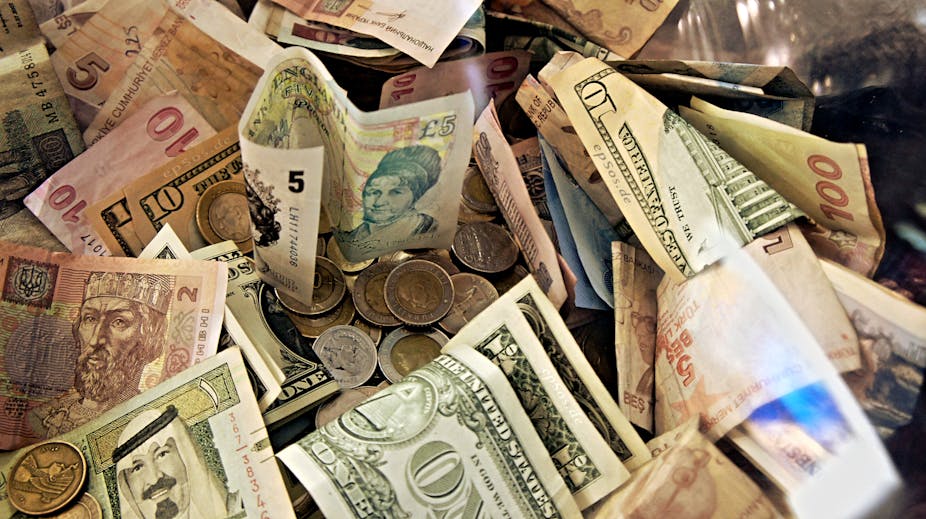This week it was revealed that the UK’s Financial Conduct Authority (FCA) is investigating allegations that London-based currency traders in large financial institutions were manipulating exchange rates of major global currencies.
It is ironic that this story of possible rate fixing came out on the day in which Eugene Fama was awarded the Nobel prize in economics. Fama is famous for the “efficient markets hypothesis” that suggests market prices reflect all information which is available on a particular asset.
If the FCA’s investigation does uncover wrongdoing it would not only cast banks into further ill-repute, it would also be another nail in the coffin of the widespread belief that markets are free, fair and efficient.
So how might a group of people at different institutions be able to manipulate the rates?
Investigators suggest they would use the chat function found on most trading terminals to co-ordinate. This online interaction would be backed up by deep personal networks built offline - just four institutions control around half of the currency markets so many traders have worked along side one other and still socialise frequently. There is also a strong cross-institution trader culture, often stronger and a greater source of identity and ethics than each bank’s official corporate culture programmes.
Window trading
In this case, traders are alleged to have focused their attentions on manipulating the WM/Reuters rate, the official rate at which currency exchange is pegged. This rate is not constantly measured, but rather calculated at particular windows during the day – either on the half hour (for major currencies) or every hour (for smaller currencies), when an average is taken on trades for 30 seconds before and after that point.
The most important trading window is 4pm London time. This levels reached then are often used as official rates for the day in many other financial instruments.
But more crucially, it is also used as the rate on which traders’ performance – and hence bonuses – are calculated. If they were to manipulate this all-important 4pm rate, traders would tend to save up a set of trades and execute them all at this moment to move rates in a favourable direction. There would also be co-ordination among traders in different institutions. This practice was known as “banging the close”.
Studies have found that during these crucial trading windows there were unusual spikes or troughs in the price of particular currencies. These rapidly disappeared after the 4pm window passed.
These peaks or troughs were observed 31% of the time in the 14 most highly traded currency pairs. This has led many commentators as well as regulators to suspect that the currency rate is rigged. Some participants in the market are not so shocked however, seeing the practice of “banging the close” as a kind of public secret – there are even claims that it is good for markets.
A little fiddling of current rates might sound like a minor thing - after all, no one is killed by it. But very small movements in interest rates can add hugely to the cost of large business deals. For instance, if the cost peaks 0.2% due to manipulation it will cost you an additional US$2,000 to transfer US$1 million. This can quickly turn into massive numbers when we realise that US$4.7 trillion is traded each day.
Fix the incentives
So if currency rate manipulation is indeed taking place, what exactly might drive traders to engage in such unethical behaviour?
The most obvious answer is that their incentives were stacked in a way which encourages it. With bonuses calculated on their position during the 4pm window, making good gains during this time (gains which might quickly disappear anyway) would mean their performance would look much better than it should.
And if we have learnt one thing from all the investigations of the large banks following the financial crisis, it is that traders are almost completely focused on their bonus. It is not just money in the pocket; it is the central measure of your status within your community and indication of your ongoing career prospects.
If traders were then given the carrot of a massive bonus and a way of fudging the figures to get there, where is the stick that keeps them in line? Often, there isn’t one. Until relatively recently, most traders were given significant autonomy to get on with their job. As long as they bought home the bacon, pesky interventions were rare.
People charged with managing risk within a bank are typically seen as a pack of losers who were not good enough to make it on the trading floor. This meant they were not just over-looked; in some cases they were actively vilified.
A final factor that might play a role is the emotional payoff that comes from engaging in illicit behaviour. A recent study by psychologists found that cheating tends to give us an emotional boost – what they have described as a “cheater’s high”.
This suggests that if traders engaged in rate manipulation during the brief time window, they would not only find they have additional money in their pocket, but they would also feel good too. It would give them a nice emotional boost to help them through the last few hours of the working day. And it would be even more pleasurable if they were able to constantly get away with it.
There are several reasons why some bankers might end up fixing rates: financial incentives, social pressures, minimal oversight, or simply for the pleasure of cheating. Whatever the reason, the net effect is for currency rates to move in an unnatural way, outside of any market forces.
Eugene Fama and his followers may maintain that foreign exchange rates are set by the collective intelligence of the market. But in this case, we found that the price of currencies at 4pm in London seemed to reflect much more what was happening on the chat screens of a few traders in London.

